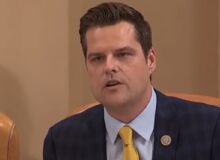This week’s readings are, as one obviously would expect on the first Sunday of Advent, full of a sense of anticipation. The interesting question is: anticipation of (or for) what?
These aren’t readings foreshadowing a baby in manger, or a peaceful and loving Lamb of God, or some other such automatically reassuring image or concept. This isn’t even the Prince of Peace. What is foretold in these readings is something less pacific, and far more powerful.
Jeremiah says the One who is promised by the Lord “shall execute justice and righteousness in the land.” The goal, the way of the Lord, “is our righteousness,” says the prophet.
Likewise in the psalm, the theme is righteousness: The Lord’s ways “are love and faithfulness,” yes — but specifically (and, it hints, only) “to those who keep his covenant and his testimonies.”
And in the Gospel reading, Jesus’ vision is full of imagery that is downright apocalyptic. Signs in sun, moon, and stars; roaring in the sea; people fainting from fear; the Son of Man coming in a cloud “with power and great glory.” The foretold day is coming “like a trap,” one for which we must “be alert” so that we may “have the strength to escape.”
When we think of Christmas, and we anticipate it during Advent, we think of things far more bucolic and comforting than this. Angels. Shepherds. Swaddling clothes.
Yet, as these readings remind us, that’s not what the messianic Jews of that time period expected. There is some evidence that Jesus himself came from the tradition of the Essenes, whose beliefs in a messiah and in eschatology were very much imbued with a sense of coming power and majesty. This was no fuzzy “God is love” stuff; this was God as executor of cosmic justice.
It is important, at the very beginning of Advent, that we remember this. Even if Jesus came to bring love, forgiveness, and redemption to this world, the nature of those Christly gifts was not, and is not, something mild, but something earth-shaking (and soul-shaking). The forgiveness is not a mere “I’m okay, you’re okay” kind of forgiveness; it is a forgiveness given so that we may again pursue justice and righteousness — a justice and righteousness that were not just cleansing, but powerfully so.
This was a redemption not just of warm fuzzies; this was the redemption of a new Earth and brilliant heaven.
The message for us today is that we must make ourselves open, at least in our inmost souls, to the coming of something (or, rather, in this case, someone) who will change our worlds, revolutionize our very existence. This is big stuff. This is not just important, but crucial — and more. As Jesus said, it will now be our time to “stand before the Son of Man.” We do so with joy — but also with a sense of overwhelming splendor.






